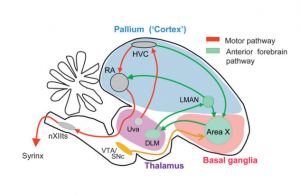
Rufous-collared Sparrow vocalizing in Chile (https://commons.wikimedia.org/wiki/File:Rufous-collared_Sparrow.jpg)
Brain plasticity is the ability of the brain to adapt to new environments or situations by building connections or forming more cells. One of the most studied cases of brain plasticity is the ability of temperate songbirds to change the size of their song control nuclei during breeding periods. The song control nuclei include 3 areas in the bird brain that allow the bird to sing. In temperate song birds the song control nuclei are stimulated through hormonal regulation via the gonads. This hormonal boost is instigated by the seasonal lengthening of the day during breeding periods. With this information researchers wanted to see if there was a similar mechanism in birds from tropical regions.
The rufous-collard sparrow is the first tropical bird to show this kind of seasonal plasticity. However, due to its environment, its song control nuclei grow by changes in the level of rainfall rather than daylight. Another difference is that while aggression and singing behavior increase during breeding, they do not increase in conjunction with hormone level changes, particularly increased levels of testosterone. Is testosterone even mediating the growth of the song control nuclei in these birds?
To test this, researchers ran two experiments: in the first experiment they implanted these tropical birds with either testosterone or an empty implant; in the second experiment they attempted to extinguish any results they found with two drugs that essentially blocked the organism’s physiological response to testosterone.
As they expected, birds that received testosterone supplements experienced growth in two of the three song nuclei. However, their testosterone blocking drugs only successfully blocked testosterone’s effects on one of the song control nuclei. Furthermore, they had to be working in conjunction to achieve success. Because the drugs only worked when they were combined, testosterone most likely acts on one of the song nuclei through its conversion to estrogen. However, they could not make any further conclusions because they only tested one of the drugs separately.

Diagram of song nuclei in a bird brain (https://commons.wikimedia.org/wiki/Category:Bird_brain#/media/File:Architecture_of_Song_Bird_Brain.png)
These results show that testosterone definitely plays a role in the growth of the song control nuclei in tropical birds. However, it cannot be the only player. The researchers noted that during this experiment, the birds did not vocalize regardless of testosterone levels. Perhaps, the stimulation of the remaining nucleus requires the active production of song. This is supported by the fact that the remaining nucleus lies downstream of those that increased in size.
The role of hormones on brain plasticity is an incredibly powerful area of research. The fact that even birds can modify their brains yearly, post-initial development can have profound consequences on brain damage and repair research in humans. Furthermore, these findings that even birds in equatorial regions have this ability suggests that plasticity can mediated by many different factors. While this research is a long way from human application, it is extremely valuable to better understand this process of brain plasticity in birds. This way, years down the line, it may potentially cross the threshold into applied medicine.
Reference:
Small, T. W., Brenowitz, E. A., Wojtenek, W., Moore, I. T. (2015). Testosterone mediates seasonal growth of the song control nuclei in a tropical bird. Brain, Behavior and Evolution, 86: 110-121.
